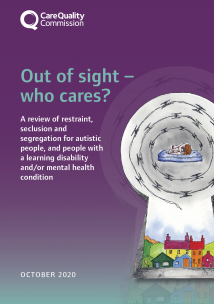CQC Report: Out of sight - who cares?

Through their review, the Care Quality Commission (CQC) found that time and time again people were not getting the care they need, when they need it. The evidence that has been gathered points to a system where people with complex needs fall through the gaps.
Based on their findings, the CQC have recommended in this report, that health, education, social care, justice and local government pool their budgets and work together to provide support for people with a learning disability, autistic people and people with a mental health condition as soon as they need it.
Summary of recommendations
For the full detailed list, please download the report
- There must be a single point of ministerial ownership for the delivery of these recommendations. This will require the minister to work with delivery partners in health, education, social care, justice and local government to pool budgets locally and work together as soon as additional support needs are identified for autistic people, and people with a learning disability and/or mental health condition.
-
There must be a named national specialist commissioner for complex care who has oversight
-
Community teams across the country must have skills in caring for autistic people, and people with a learning disability and/or mental health condition to prevent them from having a crisis, and support them when they do, in line with and expanding on NHS Long Term Plan commitment 3.35. These may be new or building on existing teams skillsets.
-
There must be human rights embedded in the commissioning and delivery of care for children and adults with a learning disability, autistic people and people with a mental health condition. Individuals’ needs must be taken into account and reasonable adjustments made to meet these needs, thereby fulfilling the need to make adjustments that are reasonable in the context of the ward and other people.
-
There must be high-quality, specialist care for people who are in hospital for short periods, which must be focused on discharge, in line with and expanding on the NHS Long Term Plan commitment 3.36.
-
CQC must improve its regulatory approach for providers of services for autistic people, and people with a learning disability and/or mental health condition.
-
There must be enough staff with the right skills, competencies and experience to provide high-quality person-centred care for autistic people, and people with a learning disability and/or mental health condition.
-
Commissioners across health and social care should encourage and support the creation of smaller, bespoke services for autistic people, and people with a learning disability and/or mental health condition, in line with Building the Right Support and its supplementary guidance for commissioners
-
Local authorities and clinical commissioning groups must report on:
a) The number of autism diagnostic assessments carried out in the community for children and adults.
b) The number of people with a learning disability and/or autistic people who are admitted to hospital.
-
People, their families and advocates must be involved in the development of services and care plans. Services must support families to do this, especially where families are located far away from people’s placements. There must also be a way for them to escalate any concerns.
-
There must be a contractual requirement on providers to inform commissioners and the NHS England regional team (depending on parliamentary approval of a regulatory requirement to inform CQC) when segregation or seclusion begins in hospitals.
-
There must be enhanced monitoring by commissioners to ensure a plan for ending restrictions is in place and milestones for achieving it are met. There must be a named person in the provider with oversight for this to report to the commissioner. Where progress is not made, this should be escalated to NHS England.
-
There must be guidance developed to ensure independent reviews required by the Mental Health Act (MHA) Code of Practice are of a consistently high standard and are focused on reducing the restrictions.
-
Care Education and Treatment Reviews (CETRs) are made statutory so that the responsible organisations are held to account.
-
The Department of Health and Social Care must amend the Mental Health Act 1983 Code of Practice to change the definition of long-term segregation to include people who are segregated for reasons other than violence and to strengthen the guidance on how to safeguard people.
-
The National Institute for Health and Care Excellence (NICE) guideline on Violence and aggression: short-term management in mental health, health and community settings should be reviewed to ensure it is not used inappropriately for long periods
-
A national reporting mechanism must be developed for the use of restrictive interventions in children’s services and adult social care services to mirror that used in hospitals.
